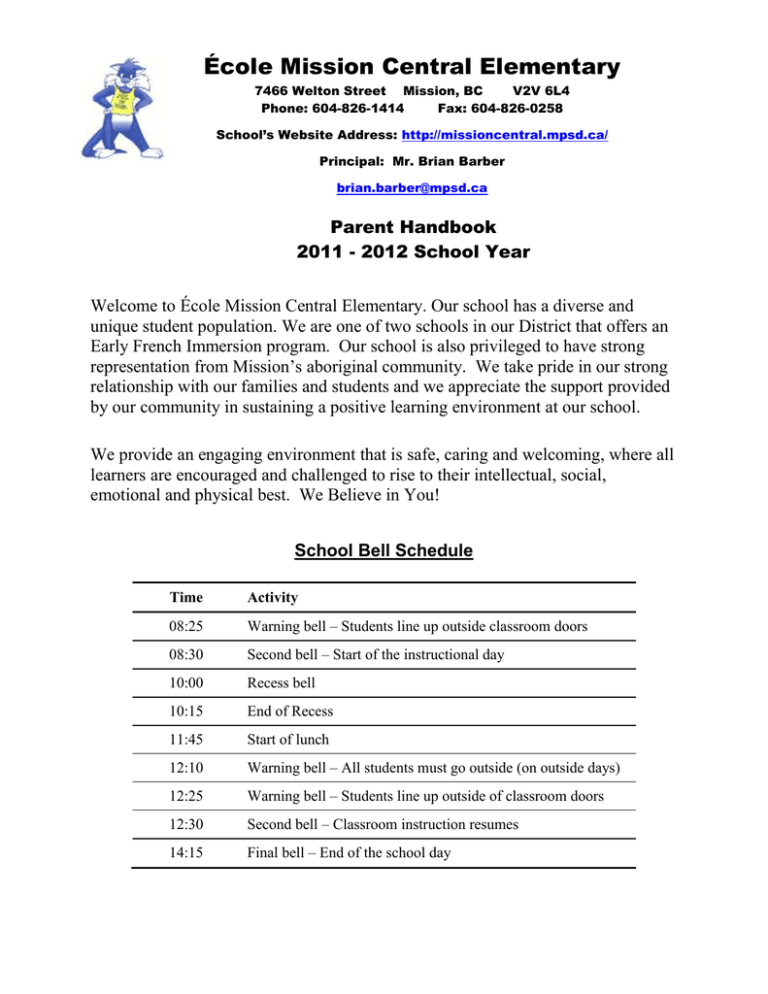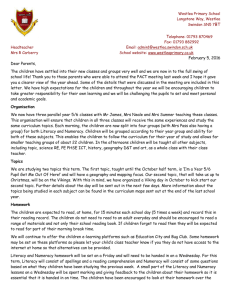School Bell Schedule - École Mission Central Elementary
advertisement

École Mission Central Elementary 7466 Welton Street Mission, BC V2V 6L4 Phone: 604-826-1414 Fax: 604-826-0258 School’s Website Address: http://missioncentral.mpsd.ca/ Principal: Mr. Brian Barber brian.barber@mpsd.ca Parent Handbook 2011 - 2012 School Year Welcome to École Mission Central Elementary. Our school has a diverse and unique student population. We are one of two schools in our District that offers an Early French Immersion program. Our school is also privileged to have strong representation from Mission’s aboriginal community. We take pride in our strong relationship with our families and students and we appreciate the support provided by our community in sustaining a positive learning environment at our school. We provide an engaging environment that is safe, caring and welcoming, where all learners are encouraged and challenged to rise to their intellectual, social, emotional and physical best. We Believe in You! School Bell Schedule Time Activity 08:25 Warning bell – Students line up outside classroom doors 08:30 Second bell – Start of the instructional day 10:00 Recess bell 10:15 End of Recess 11:45 Start of lunch 12:10 Warning bell – All students must go outside (on outside days) 12:25 Warning bell – Students line up outside of classroom doors 12:30 Second bell – Classroom instruction resumes 14:15 Final bell – End of the school day Staff List Office/Support Staff Mr. Brian Barber ....................................................................................................................... Principal Mrs. Mary Godley.................................................................................................................... Secretary Mr. Stewart Davis ........................................................................... Division 1, Grades 5/6 Room 139 Mme. Marie-Hélène Gauthier ...................... Division 2, Grades 4/5/6 (French Immersion) Room 135 Mr. Darren Chezzi ............................................................................. Division 3, Grade 4/5 Room 131 Ms. Amber Chung .............................................................................. Division 4, Grade 3/4 Room 140 Mr. Doug Mariner ............................................................................... Division 5, Grade 2/3 Room125 Mme. Hilary von Hertzberg .............................. Division 6, Grade 2/3 (French Immersion) Room 156 Mrs. Barbara Garland........................................................................... Division 7, Grade 2/3 Room152 Mrs. Cissy Wong ............................................................................... Division 8, Grade 1/2 Room 155 Mme. Diane Moreau ............................................ Division 9, Grade 1 (French Immersion) Room 148 Mme. Isabelle McKinnon ................................................................ Division 10, Grade K/1 Room 151 Mrs. Jean Greenshields .................................................................. Division 11, Grade K/1 Room145 Ms. Jen Hillier.................................................... French Immersion English Language Arts Room 135 T.B.A............................................................................................... French Immersion L.A. Room 148 Mrs. Carolyn Armitstead ..................................................................... Learning Assistance Room 124 Mrs. Maria Hedderson ………………………......................................... ...... Teacher-Libarian Library Mrs. Diana McCall.......................................................................... StrongStart Coordinator Room 129 Mrs. Donna Archibald ................... Mission Neighbourhood Learning Centre Coordinator Room 130 ABORIGINAL DEPARTMENT……………………………………………… .... Rooms 128 & 130 Mr. Bill Fletcher .................................................................. District Principal of Aboriginal Programs Mrs. Marcie Buell………………………………………………… .. Aboriginal Department Secretary Ms. Erica Jurgens ………………………………………………………………Aboriginal Coordinator Mr. Johnny Williams ........................................................................... Aboriginal Cultural Coordinator Mr. Wayne Martin ...................................................................................... Aboriginal Support Worker Educational Assistants Ms. Julie Baker, Ms. Brooke McKamey, Ms. Brenna Pennell, Mrs. Dawn Stackhouse and Mr. Jack Verigan Supervision Assistants Mrs. Karinanne Buckner Mrs. Mavis Leckie Mrs. Irene Parker Mrs. Johanna Ulhmer Custodial Staff Ms. Lynn Egan Mr. Gerry Heriot Attendance Attendance patterns are important indications in predicting how well students will succeed at school. Students who attend school regularly (and on time) usually experience greater success. Parent support in this regard is greatly appreciated. If your child will be absent from school, please notify the school at (604) 826-1414. Code of Conduct Statement of Purpose Our School’s Code of Conduct is designed to ensure that all students are given opportunities to excel to their potential in an environment that is safe, caring and orderly. The School’s Code of Conduct supports the values expressed in the BC Human Rights Code and promotes behaviours that ensure that all members of our school foster respect for one another, are considerate and understanding of the rights that all members of our school community possess, and recognize our individual and collective responsibility that we have to the whole community. Safe, Caring, and Orderly schools promote: safety for themselves and their peers respectful behaviour toward themselves, each other, their belongings and property students taking responsibility for themselves and others Mutual Respect The purpose of mutual respect is to assure everyone that their individual cultural values, beliefs and needs will be considered and properly honoured. It also means respect by adults for children’s rights, needs and differences. Within the school community, it means respect for: others – no matter what their race, gender, age, colour or learning ability newcomers from other cities, provinces or countries teachers, support staff, parents and other adults in our school individual skills, talents and contributions Behaviour Guidelines Most problems that arise at school, are typically social in nature, and are dealt with by the teacher, noon hour supervisor or principal, usually by a simple discussion. At our school, where possible, we use consequences that are restorative in nature, rather than punitive. The misbehaviours and the resulting consequences are viewed as an opportunity for students to learn through direct teaching, guidance and support. Consequences are implemented on a case-bycase basis, based on the severity and the frequency of the behaviour with progressive discipline methods utilized to assist in guiding the inappropriate and/or unsafe behaviour. Rising Expectations Expectations for student conduct increase as students become older, more mature and move through successive grades. Consequences and student responsibility increase accordingly. Special consideration may apply to students with special needs if they are unable to comply with the Code of Conduct due to having a disability of an intellectual, physical, sensory, emotional or behavioural nature. Acceptable Conduct Every day students at École Mission Central practise safe and appropriate behaviour. To name a few, at any time through the day, students can be observed: listening attentively to their teacher following directions raising their hand, waiting their turn to speak using a kind and respectful voice playing cooperatively at recess and lunch engaging in learning assisting others when required behaving safely being inclusive in their playing with others being tolerant of the differences of others modeling respectful and responsible behaviour while acting as school ambassadors (while on field trips or participating in athletic events) One way we teach our students to demonstrate appropriate behaviour is through the acronym, “S.U.P.E.R.”. S.U.P.E.R., standing for Safety, Unity, Participation, Excellence and Respect/Responsibility, gives staff and students common language when discussing behaviours. In addition to S.U.P.E.R., we also utilize the W.I.T.S. acronym. Walk Away (and tell an adult if appropriate), Ignore (and tell an adult if appropriate), Talk it out (use your words and tell an adult if appropriate), and Seek Help gives students many proactive strategies should they encounter conflict with their peers. Unacceptable Conduct: From time-to-time, a few students breach our School’s Code of Conduct and as such are subjected to consequences for their actions. Some forms of unacceptable conduct include, but are not limited to: …behaviours that interfere with the learning of others interfere with an orderly environment create unsafe conditions demonstrate lack of respect for the environment and school property demonstrate dishonesty misuse class time …acts of verbal/physical aggression bullying intimidation harassment vandalism fighting disrespecting others’ personal space and belongings theft inappropriate representation of our school (while on field trips or participating in athletic events) …significant breaches and/or illegal acts, such as encouragement of fighting swearing at staff possession, use, or distribution of illegal or restricted substances possession or use of weapons inciting racial hatred Consequences The foundation component of appropriate behaviour is role modeling and teaching. Therefore, expected behaviour is mostly proactive. In the elementary years, misbehaviours are viewed as an opportunity for students to learn through appropriate consequences for their actions. Depending on the nature and frequency of the misbehaviour, these consequences could include, but are not limited to: conversation with the student(s) to problem solve warnings about repeated behaviour restitution contacting and meeting with parents healing circle loss of privileges conflict resolution strategies including small group mediations recess and/or lunch time detentions referral for school-based services counselling intervention in-school suspension out of school suspension referral to District Staff referral to the District Review Committee Reporting/Notification From time-to-time students may either observe, or are the recipient of behaviour, either inside or outside of the classroom, which violates our school’s code of conduct. When this occurs, students are asked to report the incident to their classroom teacher, if it occurs during instructional time or to the teacher on duty or principal if the incident occurs during recess and to the noon hour supervisor or principal, if the incident occurs during lunch. Students are also asked to report unsafe behaviour they observe either to the classroom teacher, an adult on duty or the principal. Parents are asked to contact their child’s teacher as the first step in addressing unwanted behaviour toward their child should it occur in the classroom or the principal if the behaviour occurs outside of the classroom, such as before and after school and/or recess and lunch. Please note that the school will take all reasonable steps to prevent retaliation by a person against a student who has made a complaint of a breach our code of conduct. Depending on the nature of the misbehaviour, the school staff may have an obligation to contact the following: parents or guardians of the student offender (s) parents or guardians of the student victim(s) Director of Instruction – Student Services RCMP and other agencies as required by law School staff and school community as deemed appropriate by the school and/or District administration At École Mission Central… we believe that a positive climate is built through inclusion, sharing and caring, encouragement of participation and high expectations for each and every child. At our school we provide an engaging environment that is safe, caring, orderly and welcoming, where all learners are encouraged and challenged to rise to their intellectual, social, emotional and physical best. We Believe in You! School Dress Code Students must wear clothing that displays only appropriate logos and slogans Straps on sleeveless tops must be wide enough to cover most of the shoulder area. The bottom edge of a shirt (or other top) must cover the top of pants, skirt or shorts, both when the wearer is standing or sitting. Shorts and skirts must be of appropriate length Necklines are to be appropriate Head coverings may not be worn within the building, unless it is for religious reasons Picking Children Up from School If you would like an adult (other than those specified in the school’s files) to pick up your child after school, please make sure that you send a note to the child’s teacher informing them of your wishes. Please note that we will not release children to adults who are not listed as contacts in our school’s files unless we have explicit permission from the child’s parents. Weapons (Real and Toy) In accordance with our School District Code of Conduct, no weapons, real or toy, are permitted at school. Laser pointers are considered in this class, due to the potential for serious eye damage. Vandalism Vandalism is a very serious offence at all Mission Public Schools. Students who are caught vandalizing school property or equipment may face suspension from school and will be held financially responsible for damages incurred. In some cases, the RCMP may become involved. The community of Mission takes great pride in our facility and we expect that all students will value and respect it. Student Use of Phone Students are only permitted to use the telephone during an emergency. All other arrangements need to be made at home the night before. Electronic Devices Electronic devices such as portable electronic games (Nintendo DS, Sony PSP) and MP3’s/Ipod’s are not permitted in school. Cell phones may be brought, but must be turned off during the school day. In the event that a student ignores this policy, the item will be confiscated and parents will be notified. Skateboards, Roller Shoes, Bicycles and Scooters Skateboards and Roller Shoes are not permitted at school. If students are using their bicycle or scooter as transportation to school, then they must use the bike rack and lock up their bicycles and scooters. Such items cannot be stored in the school. School Homework Guidelines Homework gives us the opportunity to extend learning for our students beyond the school day. Reading is not considered homework, but should be encouraged every night. The most common reasons for assigning homework are: practice, preparation and to catch up on work that has not been completed during the regular school day. Homework is not necessarily assigned every night. The following suggestions are provided to guide parents in helping their children make homework a successful experience: Help set up a consistent place for homework to be done. Help your child establish a consistent schedule. Consistent use of a daily planner will help in developing organizational skills. Encourage, motivate, and prompt your child, but do not do the homework yourself. Although there might be exceptions, the amount of time your child should spend on homework is roughly equivalent to 10 minutes per grade level. For example: Grade 1 - 10 minutes per night Grade 2 - 20 minutes per night Although students benefit from learning the discipline of routine homework assignments, as a rule they should not be spending a great deal more time than 10 minutes per grade level each night. If you have any concerns about the homework your child is receiving, please contact the teacher for clarification. Student Recognition Super Student Tickets are given to students who demonstrate positive behaviours that follow our school code of conduct. Every month all super student tickets are placed in a draw that takes place during our student recognition assemblies. Student recognition assemblies happen monthly. Each classroom teacher recommends the names of students from their class to be recognized with a certificate during this assembly. Every month we publish the students’ names in our school newsletter. We also recognize members of our athletic teams, and provide opportunities for student-volunteers to perform in front of the school. Students in the intermediate grades who achieve letter grades of “B” or higher in academic subjects are placed on the school Honour Roll. These students receive certificates at the end of each reporting term. Effort Roll certificates are also given to intermediate students who meet the criteria of straight “G’s” on their report card. These students receive certificates at the end of each reporting term. Finally, at the end of the school year, we present service certificates for students who have assisted throughout the school year in areas such as gym equipment monitors, office monitors, library monitors, etc School Policy – Classroom Placements The process of making up classes for each school year begins in May and is based on the best information available at that time. The school staff meets and follows a process that considers the following factors. This list is not in priority order: the teaching style of the teacher and the learning style of the student the child's physical and social maturity male/female balance in each class the balance of leaders and athletes in each class the number of years the child has been with the teacher. the child's interactions with other students the child's needs in social, emotional, and behavioural areas the child's intellectual development level the age of the child student friendships the best use of education assistants the child's need for learning assistance or special education services the placement which will afford the child the greatest chance of success parental requests – (in writing to the principal by May 1st) Although we will attempt to meet parent requests, we cannot guarantee to satisfy all requests. Home School Communication Occasionally, parents have concerns or questions about their child’s program at school. Parents are encouraged to use the following process to resolve their concerns: 1. Discuss the matter with your child’s teacher. Often after an initial discussion with the teacher, the concern is resolved. 2. If, after discussing the matter with your child’s teacher, you still have concerns, please speak to the principal. Often, a three-way meeting is successful in addressing the concerns. Parent Volunteers Studies show that parental involvement in education results in greater student success, better attitudes towards school, and higher graduation rates. There are many ways you can volunteer at school, including reading to children in the classroom, assisting with preparing materials for projects, supervising on field trips, and becoming involved in the PAC or SPC. All volunteers must complete the appropriate district forms, which are available from the school office. (Driver’s Abstract and/or Criminal records check). Parents are encouraged to complete the necessary forms early in the school year. All parents are automatically members of the school Parent Advisory Council (PAC), and are welcome to attend and vote at general meetings. For meeting dates and times, contact the school.



